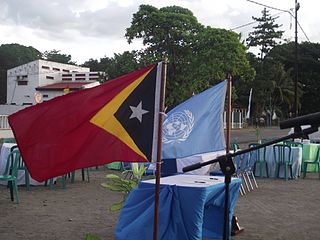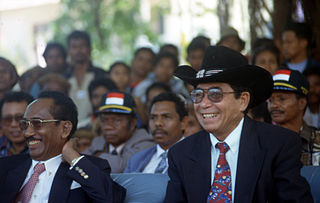
José Alexandre "Xanana" Gusmão is an East Timorese politician. He has served as the 6th prime minister of East Timor since 2023, previously serving in that position from 2007 to 2015. A former rebel, he also served as East Timor's first president since its re-establishment of independence, from 2002 to 2007.

East Timor, officially the Democratic Republic of Timor-Leste, is a country in Southeast Asia and Oceania. The country comprises the eastern half of the island of Timor and the nearby islands of Atauro and Jaco. The first inhabitants are thought to be descendant of Australoid and Melanesian peoples. The Portuguese began to trade with Timor by the early 16th century and colonised it throughout the mid-century. Skirmishing with the Dutch in the region eventually resulted in an 1859 treaty for which Portugal ceded the western half of the island. Imperial Japan occupied East Timor during World War II, but Portugal resumed colonial authority after the Japanese surrender.

Balibo is a town in East Timor situated approximately 10 kilometres from the Indonesian border. It is located in the sub-district of Balibo, Bobonaro District.

The Association of Timorese Heroes, sometimes known as Sons of the Mountain Warriors, is a culturally conservative political party in East Timor. In 2007, KOTA said it had 30,000 members.

The International Force East Timor (INTERFET) was a multinational non-United Nations peacemaking task force, organised and led by Australia in accordance with United Nations resolutions to address the humanitarian and security crisis that took place in East Timor from 1999–2000 until the arrival of UN peacekeepers. INTERFET was commanded by an Australian military officer, Major General Peter Cosgrove.

Besi Merah Putih, meaning 'red and white iron' in Indonesian, was the official name of an East Timor, approximately 200-strong, pro-Indonesia militia (Wanra). It operated in Maubara, in the district of Liquiçá, and in the neighbourhood of the river Lóis, west of the capital Dili, under the leadership of Manuel de Sousa and with the support of Leoneto Martins, the district administrator (Bupati) of Liquiçá. It was founded on 27 December 1998 in Cai-Cassa, East Timor. The Indonesian ex-general Prabowo had direct links to Besi Merah Putih and trained members at a Kopassus base near Bogor in West Java. Tomé Diogo is also rumoured to have direct links to the BMP. The Indonesian army member is said to have led the militia directly.

The Armed Forces for the National Liberation of East Timor originally began as the military wing of the Fretilin party of East Timor. It was established on 20 August 1975 in response to Fretilin's political conflict with the Timorese Democratic Union (UDT).

An independence referendum was held in East Timor on 30 August 1999, organised by United Nations Mission in East Timor. The referendum's origins lay with the request made by the President of Indonesia, B. J. Habibie, to the United Nations Secretary-General Kofi Annan on 27 January 1999, for the United Nations to hold a referendum, whereby East Timor would be given choice of either greater autonomy within Indonesia or independence.

The Indonesian occupation of East Timor began in December 1975 and lasted until October 1999. After centuries of Portuguese colonial rule in East Timor, the 1974 Carnation Revolution in Portugal led to the decolonisation of its former colonies, creating instability in East Timor and leaving its future uncertain. After a small-scale civil war, the pro-independence Fretilin declared victory in the capital city of Dili and declared an independent East Timor on 28 November 1975.

The 1999 East Timorese crisis began with attacks by pro-Indonesia militia groups on civilians, and expanded to general violence throughout the country, centred in the capital Dili. The violence intensified after a majority of eligible East Timorese voters voted for independence from Indonesia. Some 1,400 civilians are believed to have died. A UN-authorized force (INTERFET) consisting mainly of Australian Defence Force personnel was deployed to East Timor to establish and maintain peace.
United Nations Security Council resolution 1264, adopted unanimously on 15 September 1999, after recalling previous resolutions on East Timor (Timor-Leste), the Council authorised the establishment of the multinational International Force for East Timor (INTERFET) to restore peace and security in the territory, facilitate humanitarian assistance and protect the United Nations Mission in East Timor (UNAMET).

The Santa Cruz massacre was the murder of at least 250 East Timorese pro-independence demonstrators in the Santa Cruz cemetery in the capital, Dili, on 12 November 1991, during the Indonesian occupation of East Timor and is part of the East Timor genocide.
The Scorched Earth Operation refers to actions of paramilitary groups during the events of September 1999 in Dili, the capital of East Timor. The country had been under Indonesian occupation since 1975, and resistance by Timorese peaked in 1999. Following a referendum on Timorese independence, pro-Indonesian militia and military rampaged through East Timor destroying vital infrastructure.
Australia, a close neighbour of both Indonesia and East Timor, was the only country to recognise Indonesia's annexation of East Timor. Some members of the Australian public supported self-determination for East Timor, and also actively supported the independence movement within Australia. The Australian Government saw the need for both stability and good relations with their neighbour, Indonesia. However, it was criticised in some quarters, including by Xanana Gusmão for putting those issues above human rights. In 1998, the Howard government changed its stance and supported East Timor self-determination, prompting a referendum that saw East Timor gain its independence.

The Mahidi was a militia in East Timor loyal to Indonesia. Its origin is traced back to groups who lost lands and power for fighting the Portuguese and those who collaborated with the Japanese during World War II. The militia was founded in December 1998 and its operations were centered around the Cassa area in the southern Ainaro district. The location is strategic since it is at the crossroads between Manufahi, Ainaro, and Cova Lima districts. Mahidi participated in the 1999 East Timorese crisis, and the group was one of the most violent of the armed forces during the crisis. They were linked to the Suai Church massacre which led to around 200 deaths as well as other mass killings.
NemecioLopes de Carvalho is an East Timorese paramilitary figure noted for his activities during and after East Timor's bid for independence. He was the deputy commander of Mahidi, the pro-Indonesian militia group founded by his brother Cancio de Carvalho.

East Timor independence formally occurred on 20 May 2002.

João da Costa Tavares was the Commander-in-Chief of the pro-Indonesian Militia in East Timor. He was also a pro-integration militiamen.

United Nations Administered East Timor refers to the period between 25 October 1999 and 20 May 2002 when East Timor was administered by the United Nations Transitional Administration in East Timor as a United Nations protectorate.
Alex Tilman is an East Timorese actor. For his performance in Answered by Fire he was nominated for the 2007 Logie Award for Logie Award for Most Outstanding Newcomer. Tilman lived through some of the events depicted in that film, his father was a Fretilin resistance member who disappeared after being arrested in 1978. He later worked as an interpreter in the Serious Crimes Unit in Timor, including working with Australian police officer David Savage who was the inspiration for David Whenam's character in the film. Like many of the Timorese actors in the film Tilman had no prior acting experience.













